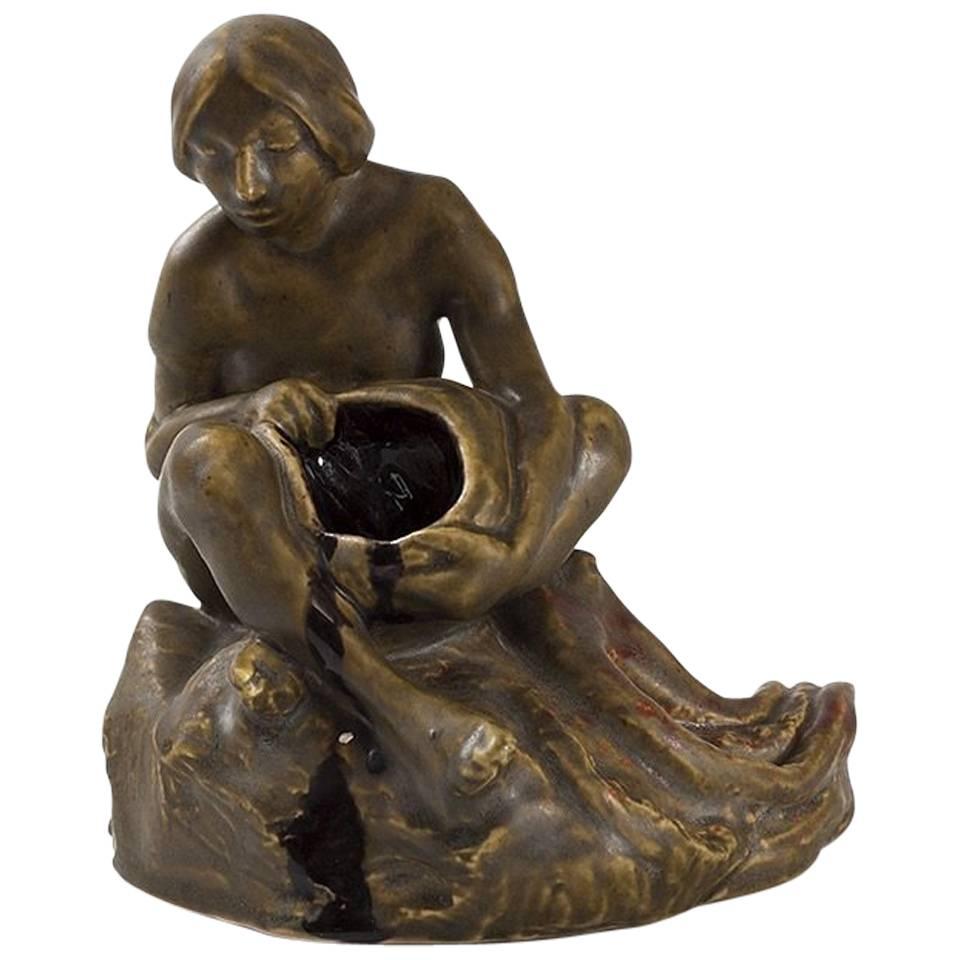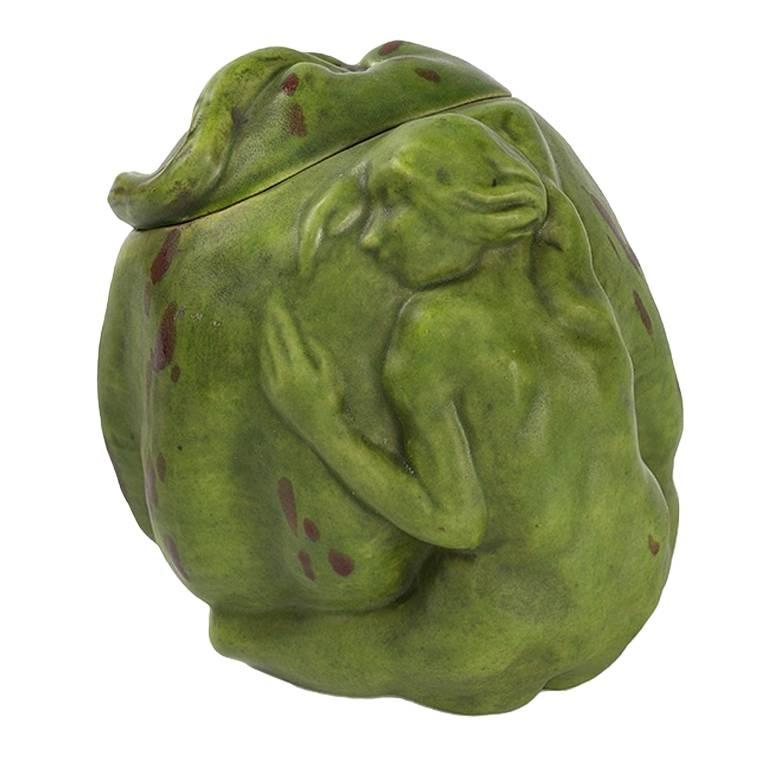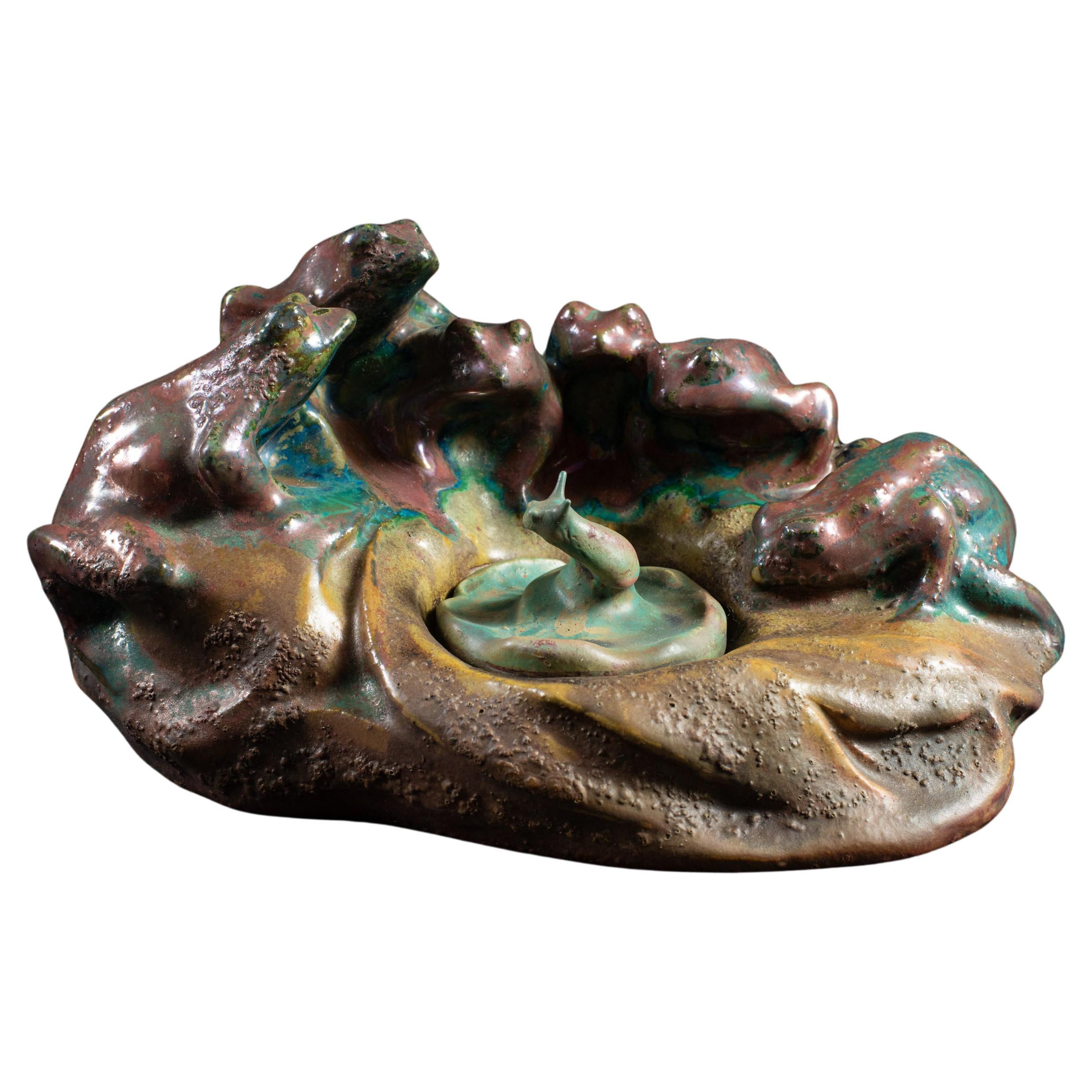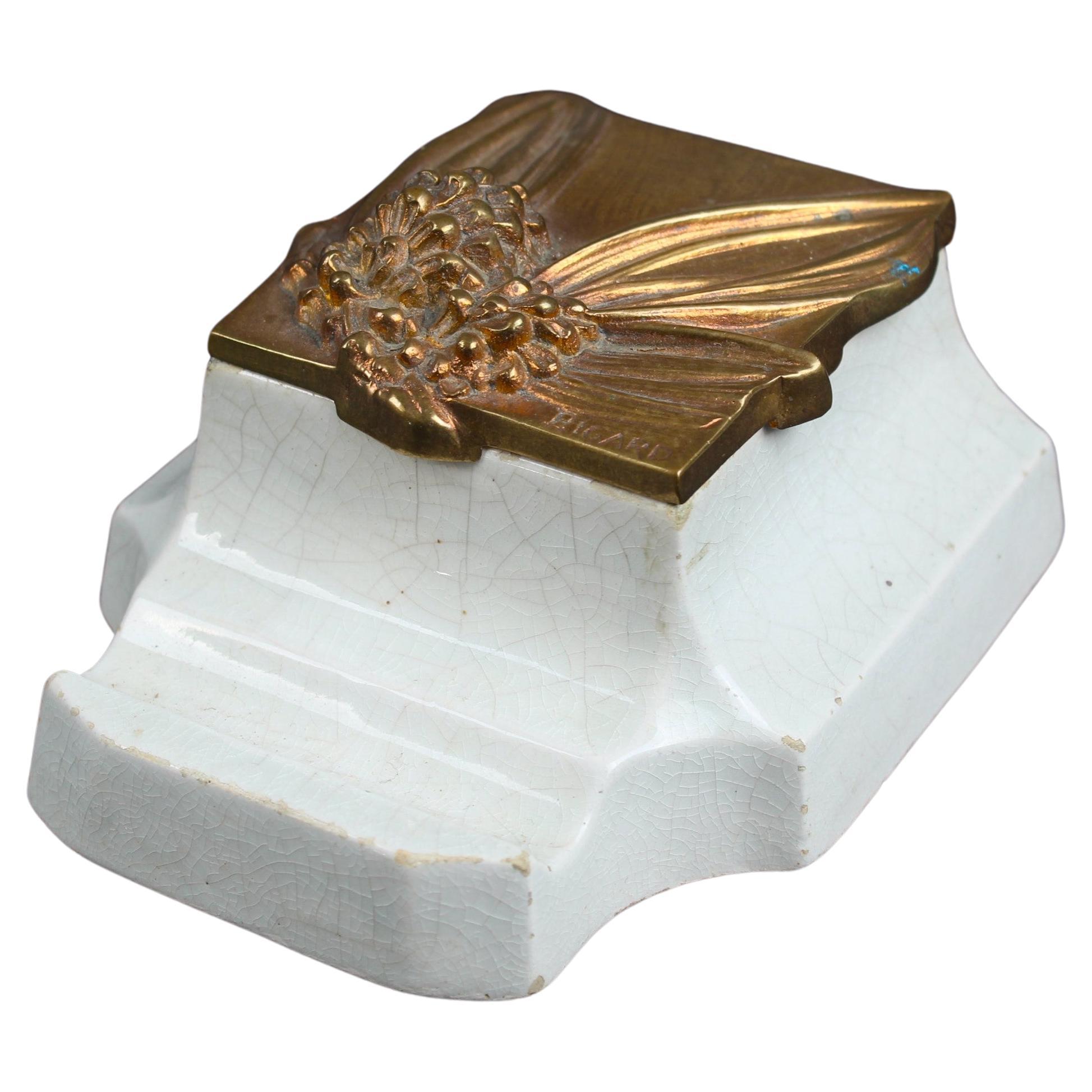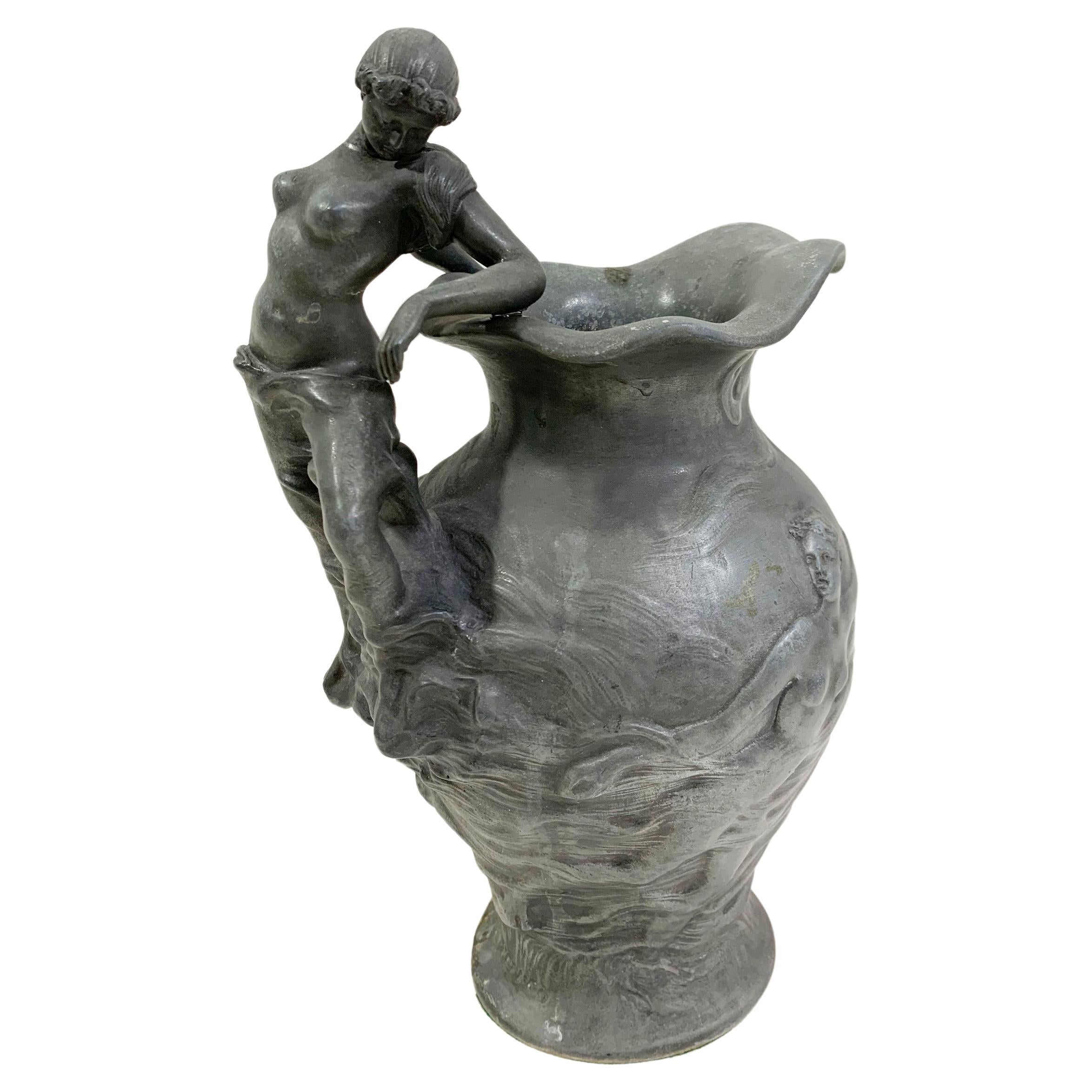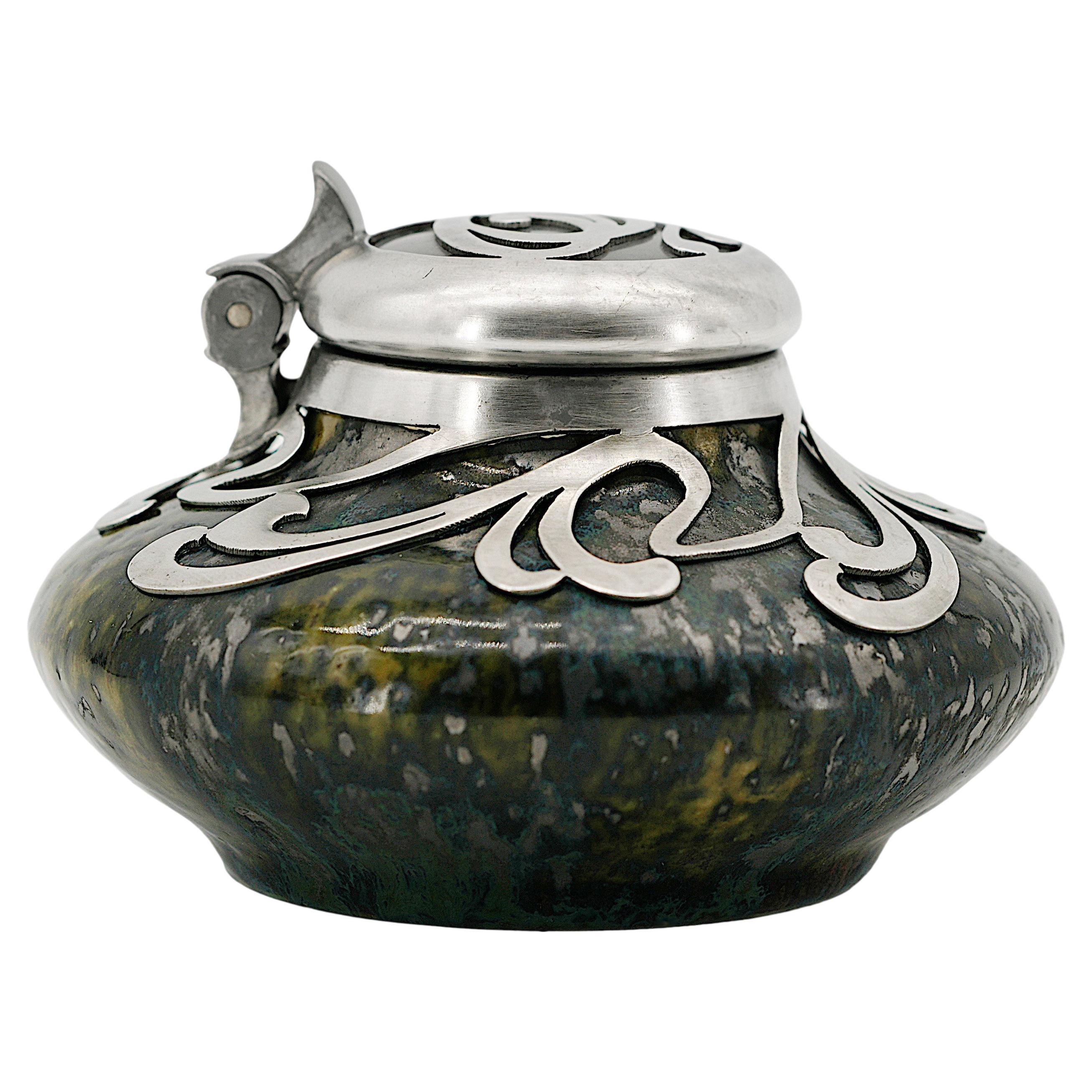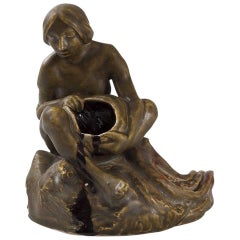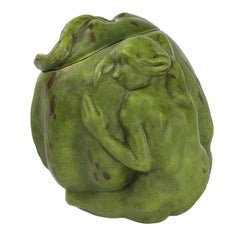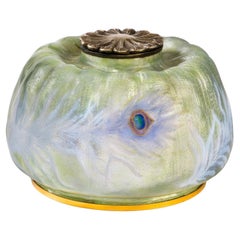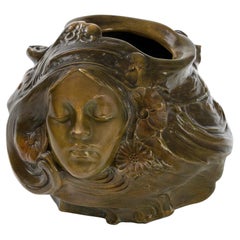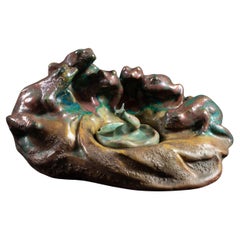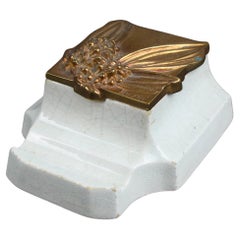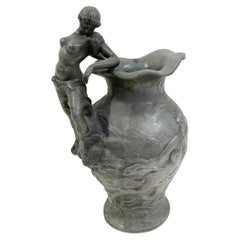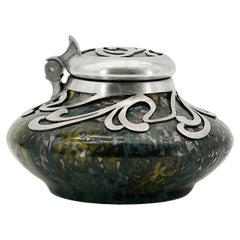Items Similar to French Art Nouveau Ceramic Inkwell by Carabin
Want more images or videos?
Request additional images or videos from the seller
1 of 7
French Art Nouveau Ceramic Inkwell by Carabin
$15,000
£11,286.11
€13,035.69
CA$21,198.92
A$23,004.05
CHF 12,190.12
MX$282,133.53
NOK 150,851.88
SEK 142,547.04
DKK 97,317.95
About the Item
A French Art Nouveau "Femme à la Coloquinte," glazed ceramic inkwell by François-Rupert Carabin. The inkwell feature a nude woman embracing an unusually large gourd, circa 1900.
A similar sculpture is pictured in: L’ouevre de Rupert Carabin, 1982-1932, catalogue of the exhibition at le Musée du Luxembourg, Paris, 1974, p. 230, cat. no. 189.
Signed, ''Impressed artist cipher 30''.
(MG #17984)
- Creator:François-Rupert Carabin (Sculptor)
- Dimensions:Height: 5.25 in (13.34 cm)Width: 6 in (15.24 cm)Depth: 4 in (10.16 cm)
- Style:Art Nouveau (Of the Period)
- Materials and Techniques:Ceramic,Glazed
- Place of Origin:
- Period:1900-1909
- Date of Manufacture:circa 1900
- Condition:
- Seller Location:New York, NY
- Reference Number:Seller: C179841stDibs: LU88546840933
About the Seller
4.8
Recognized Seller
These prestigious sellers are industry leaders and represent the highest echelon for item quality and design.
Established in 1971
1stDibs seller since 2010
48 sales on 1stDibs
Typical response time: 13 hours
- ShippingRetrieving quote...Shipping from: New York, NY
- Return Policy
Authenticity Guarantee
In the unlikely event there’s an issue with an item’s authenticity, contact us within 1 year for a full refund. DetailsMoney-Back Guarantee
If your item is not as described, is damaged in transit, or does not arrive, contact us within 7 days for a full refund. Details24-Hour Cancellation
You have a 24-hour grace period in which to reconsider your purchase, with no questions asked.Vetted Professional Sellers
Our world-class sellers must adhere to strict standards for service and quality, maintaining the integrity of our listings.Price-Match Guarantee
If you find that a seller listed the same item for a lower price elsewhere, we’ll match it.Trusted Global Delivery
Our best-in-class carrier network provides specialized shipping options worldwide, including custom delivery.More From This Seller
View All"Femme Au Pieuvre" French Art Nouveau Glazed Ceramic Inkwell by Rupert Carabin
By François-Rupert Carabin
Located in New York, NY
A French Art Nouveau "Femme-Pieuvre," brown glazed ceramic inkwell by Rupert Carabin, wherein a woman ecstatically rips open the head of an octopus, spilling its ink. A beautiful pl...
Category
Antique 1890s French Art Nouveau Figurative Sculptures
Materials
Ceramic
French Art Nouveau Ceramic Covered Jar by Rupert Carabin
By François-Rupert Carabin
Located in New York, NY
A French Art Nouveau ceramic covered jar by Rupert Carabin, depicting a female nude wrapped around a gourd form, with a deep green glaze. All of C...
Category
Antique Early 1900s French Art Nouveau Jars
Materials
Ceramic
Eugène Feuillâtre "Pavot" Inkwell
By Eugène Feuillatre
Located in New York, NY
This stunning enamel, silvered metal, and gilt metal "Pavot" inkwell by Eugène Feuillâtre features peacock feather embellishments. The Inkwell lies under the gilded and silvered metal poppy seed pod lid, to which the title pavot (translated to English as poppy) refers. The vessel is vaguely pumpkin-shaped with negative space in a honeydew green, with white peacock feathers featuring purple and turquoise details.
Product Details:
Item #: S-21164
Artist: Eugène Feuillâtre
Country: France
Circa: 1900
Dimensions: 2.25" height, 3.5" diameter
Materials: Enamel, Silvered Metal, Gilt Metal
Signed: impressed Feuillâtre
Exhibition History: Examples of this inkwell can be found in the permanent collections of Musée d’Art et d’Histoire, Geneva (inv. no. E 01500), Musée des Arts Décoratifs, Paris (inv. no. 8746), and Museum für Kunst und Gewerbe, Hamburg (inv. no. 1966.1). Salon des Artistes français, 1898.
Literature: L. Bénédite, et. al., "Exposition Universelle de 1900: Les Beaux-Arts et les Arts Decoratifs," Gazette des Beaux-Arts, Paris, 1900, p. 510 (for a related example). H. Frantz, "E. Feuillatre, Emailleur," L’Art Décoratif, no. 28, Paris, January 1901, p. 166 (for a related example). C. Saunier, "Céramique, Verrerie, Émail," L’Art Décoratif, no. 34, Paris, July 1901, p. 155 (for a related example). R. Marx, La Décoration et les Industries d'Art à l'Exposition Universelle de 1900, Paris, 1901, p. 95 (for a related example). M. P. Verneuil, "L'Émail et les Émailleures," Art et Décoration, no. 2, Paris, February 1904, pp. 37-39 (for a related example). M. Rheims, L'Objet 1900, Paris, 1964, p. 34, no. 18 (for a related example). P. Garner, ed., The Encyclopedia of Decorative Arts 1890-1940, New York, 1978, p. 95 (for a related example). Die Jugendstil - Sammlung: Band 1: Künstler A-F, exh. cat., Museum für Kunst und Gewerbe, Hamburg, 1979, pp. 465-466, cat. no. 655. A. Duncan, The Paris Salons 1895-1914, Volume V: Objets d'Art & Metalware, Suffolk, 1994, p. 252 (for related examples). G. de Bartha, L'Art 1900: La Collection Neumann, New York, 1994, p. 128 (for a related example). J. T. Busch and C. L. Futter, Inventing the Modern World: Decorative Arts at the World’s Fairs, 1851-1939, exh. cat., Carnegie Museum of Art, Pittsburgh, 2012, p. 196, no. 9 (for a related example).
Macklowe Gallery Curator's Notes:
Eugène Feuillâtre’s career began in René Lalique’s enamelling...
Category
Early 20th Century French Art Nouveau Inkwells
Materials
Metal, Enamel
François Madurell "Female Faces" Bronze Jardinière
By Art de France
Located in New York, NY
"Female Faces" is a Bronze Art Nouveau planter by François Madurell of a woman's visage. The crowned woman, whose eyes are closed in a dream state, appears to float amidst poppy blos...
Category
Early 20th Century French Art Nouveau Planters and Jardinieres
Materials
Bronze
Hector Guimard Large Glazed Ceramic Planter
By Hector Guimard
Located in New York, NY
An ocean of sinuous, sweeping lines frozen in motion, this large-scale ceramic Art Nouveau planter by Hector Guimard (executed by Gilardoni et Brault, Choisy-le-Roi), demonstrates in an arresting array of earthen greenish and purplish hues, and is sensational from every angle. The planter is constructed of a central component with two flanking portions in slightly reduced proportions, unified by the complex constellation of swirling lines and undulating surfaces that adorn the entire composition.
Artist: Designed by Hector Guimard, executed by Gilardoni et Brault, Choisy-le-Roi
Country: France
Circa: 1900s
Dimensions: 9.25" height, 26.25" width, 11.5" depth
Materials: Ceramic
Provenance: Lloyd and Barbara Macklowe, New York; Sotheby's New York, Important Art Nouveau from the Collection of Lloyd and Barbara Macklowe, December 2, 1995, lot 562; Marsha Miro, Bloomfield Hills, Michigan; Christie's New York, Masterpieces of Art Deco: The Marsha Miro Collection...
Category
Antique Early 1900s French Art Nouveau Planters, Cachepots and Jardinières
Materials
Ceramic
Bigot French Art Nouveau Ceramic Planter
By Alexandre Bigot
Located in New York, NY
A French Art Nouveau earthenware window box/planter by Alexander Bigot for the architect Cintrat, featuring an organic pattern that repeats itself around the base. Circa 1898.
(M...
Category
Antique 19th Century French Art Nouveau Planters and Jardinieres
Materials
Earthenware
You May Also Like
Art Nouveau Frog Inkwell by Émile Müller
By Emile Müller
Located in Chicago, US
Note: We highly recommend shipping through 1stDibs for its cost effectiveness, full insurance coverage, and reliable handling. While standard parcel services are an option, the defau...
Category
Antique 1880s French Art Nouveau Inkwells
Materials
Earthenware
Antique Art Nouveau Inkwell, Signed Gaston Bigard, 1910s, France
By Gaston Bigard
Located in Greven, DE
Exceptional beautiful inkwell by the french artist and sculptor Gaston Bigard.
Signed at the lid "BIGARD".
Ceramic with authentic craquele lacquer and a brass lid with beautiful Art ...
Category
Early 20th Century French Art Nouveau Inkwells
Materials
Brass
Art Nouveau Sculptural Pitcher by Charles Théodore Perron Signed "Ch Perron "
Located in Beirut, LB
The Art Nouveau sculptural pitcher by sculptor Charles Théodore Perron (1862-1934) is a testament to the elegance of Art Nouveau craftsmanship.
Crafted in France around 1900's, this pewter showcases Perron's keen eye for detail and artistic flair.
Showcasing semi- nude women figures inspired by naiads/mermaids giving a whimsical feel of lightness , a reclined lady at the neck of the pitcher serving as handle, and the neck with a face mask, alongside art nouveau organic motifs all in high relief.
A true collector's piece, adding a touch of sophistication to any setting, inspired by the Art Nouveau Spirit .
Charles Théodore Perron
Charles Théodore Perron, born in Paris 10th on October 16, 1862 and died in Bourg-la-Reine on December 18, 1934, is a French sculptor. A student of Falguière, Roy and Louis-Auguste...
Category
Early 20th Century French Art Nouveau Figurative Sculptures
Materials
Pewter
Pierre-Adrien DALPAYRAT French Art Nouveau Stoneware Inkwell, 1890
By Pierre-Adrien Dalpayrat
Located in Saint-Amans-des-Cots, FR
French Art Nouveau Inkwell by Pierre-Adrien Dalpayrat, France, circa 1890. A rare and exquisite Art Nouveau inkwell by renowned French ceramist Pierre-Adrien Dalpayrat (1844–1910). This finely crafted piece showcases Dalpayrat’s signature red copper-glazed stoneware, especially rich and luminous near the base. Elegantly mounted in pewter, the design exemplifies the organic flow and refined detail of the Art Nouveau period.
Dimensions: Height: 3.54 in. (9 cm) Diameter: 5.12 in. (13 cm)
Materials: Stoneware with pewter mount
Condition: Excellent+++++, museum-quality preservation
Markings: Incised signature "Dalpayrat 1500" under the base (see photo)
This inkwell is a collectible example of French ceramic art at the turn of the century—perfect for collectors of Art Nouveau, 19th-century French ceramics, or the works of Dalpayrat.
Adrien Dalpayrat (1844–1910): A Pioneer of French Ceramic Innovation
Adrien Dalpayrat was a French ceramicist and researcher who played a key role in the revival of stoneware at the end of the 19th century. Born in 1844 in Limoges, Dalpayrat studied drawing and porcelain painting in his hometown before beginning his professional career at the Jules Vieillard faience factory in Bordeaux. There, he met his wife, Marie Tallerie, with whom he had two sons—Albert and Adolphe—who would later become his primary collaborators.
Throughout his early career, Dalpayrat worked for several major ceramic manufacturers, including Ashwin (Valentine), Fouquet (Toulouse), François Blanc (Monaco), and Léon Sazerat (Limoges). In 1889, seeking greater independence, he moved to the Paris region and established his own studio in Bourg-la-Reine.
Collaborations and Artistic Evolution
Dalpayrat’s creative vision expanded through his collaboration with sculptor Alphonse Voisin-Delacroix. Together, they explored neo-Gothic and Palissy-inspired motifs, creating a remarkable ceramic bestiary. Following Voisin-Delacroix’s death in 1893, Dalpayrat partnered with Adèle Lesbros, which marked a shift in his work toward simpler, more refined vase forms influenced by Japonism.
Japanese art had been introduced to France during the 1867 Universal Exhibition, but it wasn’t until the 1878 Exhibition, particularly through the ceremonial stoneware used in the Japanese tea ceremony, that Japonism truly captivated French artists. This influence led Dalpayrat to create vessels with organic, vegetal, and animal-inspired forms.
Technical Mastery: The Secrets of Copper Red
Among all the ceramists of his time who sought to replicate the elusive Chinese “sang de boeuf” (oxblood) glaze, Adrien Dalpayrat was arguably the most successful. He didn’t simply reproduce the legendary copper red—he transformed it. By manipulating glaze thickness, firing temperature, atmosphere, and copper oxide content, he developed a unique palette of flamed and mottled red glazes that became his signature: the renowned Dalpayrat red.
He further enriched his pieces by introducing streaks and inclusions of turquoise, blue, green, and yellow—freeing the red glaze from monochromy and turning it into an expressive, living surface. His work pushed stoneware beyond function into expressive art, merging form and glaze in bold, sculptural harmony.
Beyond Ceramics: Bronze Mounts and Architectural Works
Dalpayrat also collaborated with renowned jewelers such as Ernest Cardeilhac and Keller to produce pieces mounted in gilt bronze, blending ceramics with decorative arts at the highest level.
In an effort to make his work more accessible, he opened a second faience workshop focused on simpler, more affordable pieces inspired by Nevers and Rouen ware. However, this venture faced financial difficulties and closed by 1900. The main family studio followed in 1906 as the popularity of Art Nouveau declined.
Dalpayrat then returned to Limoges, devoting his final years to painting and drawing until his death in 1910.
Legacy and Recognition
Despite financial struggles during his lifetime, Dalpayrat’s ceramics were widely acclaimed at major international exhibitions:
Bronze medal, World's Columbian Exposition, Chicago (1893)
Silver medal, Antwerp International Exhibition (1894)
Gold medal, Exposition Universelle, Paris (1900)
Today, his work is part of prestigious museum collections. In 2020, the Petit Palais in Paris acquired a large bird motif vase created in collaboration with Voisin-Delacroix, now on view in Room...
Category
Antique 1890s French Art Nouveau Inkwells
Materials
Pewter
Very Rare Art Nouveau Bronze Spoon Warmer Modeled After A Toad
Located in Austin, TX
Enjoy a serving of sheer whimsy with this unique Art Nouveau bronze spoon warmer designed as a toad. Reflecting a unique aspect of late 19th to early 20th-century artistry, it acts a...
Category
Antique Late 19th Century Art Nouveau Tableware
Materials
Bronze
Bronze Inkwell "Repos" Gustav Gurschner ca. 1900 Austrian Art Nouveau Jugendstil
By Gustave Gurschner
Located in Klosterneuburg, AT
Inkwell "Repos" (rest), Gustav Gurschner, probably Paris World Exhibition 1900
This bronze inkwell was created in the context of the 1900 ...
Category
Antique Early 1900s Austrian Jugendstil Vases
Materials
Bronze
$6,225 Sale Price
20% Off
More Ways To Browse
French Art Nouveau Ceramic
Francois Rupert Carabin
Fruit Topiary
Gaston G
Gold Statue Woman
Greek Female Sculpture
Green Bronze Statue
Hagenauer Dancer
Hagenauer Figures
Hermes Figure
Hutschenreuther Figurines
Hutschenreuther Porcelain Figurines
Indian Bronze Statues
Italian Nativity
Jere Boat
Limewood Sculpture
Louis Simon Boizot
Mandolin Player
